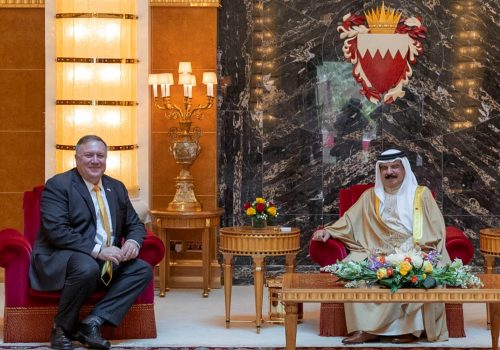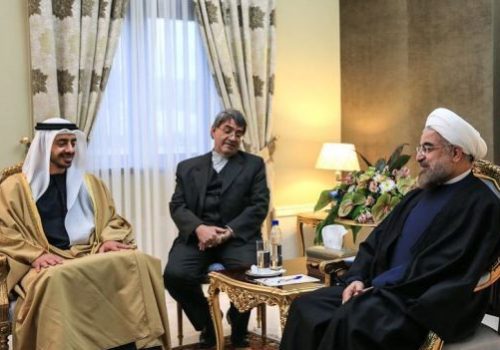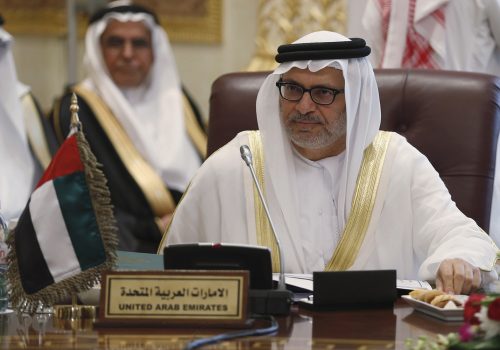From Netanyahu’s plane to White House Lawn: Behind the scenes of the Israel-Gulf deal
The long idling jet engines of Israeli-Gulf engagement came out of the hangar this week at the White House and are now reaching cruising altitude across the Arabian Peninsula. Built on three decades of under-the-radar connections led by spies and defense contractors, the shrouds have been lifted with the signing of the Abraham Accords between Israel, the United Emirates (UAE), and Bahrain, and deals are proliferating.
Flying with the press crew aboard Prime Minister Benjamin Netanyahu’s chartered El Al Boeing 777 flight from Tel Aviv to Washington, I had an excellent perch to see the impact that the agreements brokered by US President Donald Trump are having on two Israeli elites: the press and the diplomatic corps. Once we got to the majestically choreographed ceremony on the South Lawn, I got a glimpse of how they may transform Muslim-Jewish relations, Arab-Israeli business, and the Middle East political landscape.
Having just published an Atlantic Council report with Dr. Gawdat Bahgat in July on Israel’s mostly discreet commercial ties in the Gulf, it was jaw-dropping to see all those activities brought into the open and the Arabs and Israelis behind them, who only met secretly in the past, chatting at the White House like old friends in the bright noon sunlight of a late summer’s day.
Aboard Flight LY033, reporters from Israeli television networks and print media, who have been crossing swords with Netanyahu for decades, were positively shell-shocked at the prime minister’s diplomatic success. There was little way to diminish the magnitude of an achievement where two nations from the Gulf Cooperation Council (GCC), which have for years opposed ties with Israel until conflict with the Palestinians is resolved, signed political agreements and pledged themselves to cultivating “warm relations” with the Jewish state.
Most articles and TV reports were qualified by the fact that Netanyahu is in the midst of a corruption trial and tens of thousands of protesters hold vigils outside his house every week wearing face masks emblazoned with the words, “Crime Minister.” They reported on rockets being fired by Palestinian militants in the Gaza Strip at Israel’s coastal cities of Ashkelon and Ashdod, as well as Palestinian Authority President Mahmoud Abbas’ condemnation of the accords as a betrayal of Arab solidarity against normalization with Israel.
Split screens showed angry members of parliament denouncing his handling of the coronavirus pandemic—in which at least 1,170 Israelis have died and 176,933 cases have been diagnosed—as a spike in infections forces the nation into a second government-declared lockdown on the eve of Rosh Hashana, when families are accustomed to feasting together to celebrate the Jewish New Year. It’s like canceling Thanksgiving.
Bibi, as he’s known by his nickname in Israel, was not a gracious victor. Having been shamed by the press into forgoing a flight to Washington with his wife Sara on a borrowed private jet, Netanyahu barricaded himself up front in the plane’s Business Class cabin with his Mossad director and top advisers instead, refusing all contact with the reporters back in Coach seats. That is, except for Channel 20, which shows unabashed puppy-dog affection to the prime minister and, thus, later scored an exclusive interview with Netanyahu at Blair House, the presidential guest quarters.
This was all the more grating for the mainstream reporters at Haaretz, Yediot Aharonoth, the online site Walla!, and Channel 12 television, who signed a commitment to stay masked inside the plush Willard Intercontinental Hotel under strict COVID-19 restrictions until being herded to the White House in a security bubble that prevented contact with sources and old friends. Neither Trump, Netanyahu, their wives, the Gulf foreign ministers, Jared and Ivanka Kushner, most of the US cabinet, nor many of the seven hundred guests wore masks because they were “recommended” and not required by the White House.
Although Israel is a tiny nation with a population less than 10 million, Netanyahu travels with an entourage of more than 100, including advisers, cabinet ministers, speechwriters, press wranglers, and bodyguards—a bigger group than many European and Asian leaders bring on the road. In the plane’s mid-section, Israel’s diplomatic corps was bubbling with excitement about the prospect of new MENA-region ambassadorships opening up from Abu Dhabi to Khartoum. Foreign Ministry veterans who had studied Arabic and were groomed in the Oslo peace fever of the 1990s—when Israel agreed to what was supposed to be a temporary plan for limited Palestinian sovereignty in the West Bank and Gaza—to occupy posts that never materialized were contemplating an exciting new future. Some were checking out the website of Ski Dubai, which runs the indoor slope at the Mall of the Emirates, and working on pitches that might persuade their spouses to finally make the move.
At the White House, both inside the Oval Office and outside on the South Lawn, the talk was about deals. While recent attention has focused on Israeli-Gulf partnerships to support COVID-19 research and smoothen banking transactions, it was announced that a deal between a catering arm of Emirates Airline and Dubai-based CCL Holdings had been made to produce kosher meals on flights across the world.
Long jaded about contact with the Arab world because of their chilly relations with the Jordanians and Egyptians, Israelis are curious about whether connections with the UAE and Bahrain will be as warm as advertised. The isolation imposed by the pandemic has only whetted their appetite.
”It’s been a long time since the last peace treaty and Israelis are hungry for good news,” said Moran Zaga, a researcher on the Persian Gulf states at Israel’s Haifa University. “They eat it up like dessert.”
On the strategic front, she told me that the enthusiasm shown by Emiratis for the deal looks sustainable. Being a Middle East player today in the critical spheres of security and business requires engagement with Israel and it’s an integral part of Crown Prince Mohammed bin Zayed’s strategy for the UAE to “rebrand itself as a regional power.”
Riad al Khouri, an Amman-based economic analyst and political risk consultant at GeoEconomica, says the attraction makes sense because citizens of the UAE and Bahrain have never fought a war with Israel—even though they’ve backed the Palestinians and other Arab states in their seventy-two-year-old conflict with the Jewish state. But as in Egypt and Jordan, the excitement may peter out because of the deeply ingrained cultural differences, he said.
“We’re talking about flamboyant materialism; peace with rich people,” al Khouri told me. “Mr. Israeli High-Tech from Herzliya parachutes into Dubai. He doesn’t do that in Amman, Ramallah, and Cairo because the money isn’t there. That’s a great lubricant. But it’s not going to make everything work. The various people involved are going to start bickering over who gets what. Then you hit this wall,” he said.
“The ice was never broken in Amman and Cairo and it won’t be melted in Manama and Abu Dhabi,” he said.
Under the White House’s South Portico, though, where President Trump, Bahrain Foreign Minister Abdullatif bin Rashid Al Zayani, UAE Foreign Minister Abdullah bin Zayed bin Sultan Al Nahyan, and Israel’s premier spun their joint vision of a “new dawn” in Middle East relations, the deal-making engines were picking up speed.
“We are eager to invest in a future of partnership, prosperity, and peace,” Netanyahu told the crowd below. “Israelis, Emiratis, and Bahrainis are already embracing one another.”
Jonathan H. Ferziger is a Jerusalem-based nonresident senior fellow at the Atlantic Council and a former Middle East reporter for Bloomberg News. Follow him on Twitter: @jhferziger.
Image: Bahrain’s Foreign Minister Abdullatif Al Zayani, Israel's Prime Minister Benjamin Netanyahu and United Arab Emirates (UAE) Foreign Minister Abdullah bin Zayed display their copies of signed agreements, via REUTERS/Tom Brenner/File Photo


